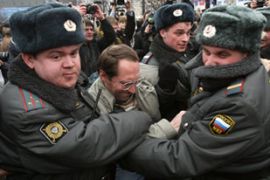Russians protest against government
Thousands take part in “Day of Anger” at the Kremlin’s handling of the economy.

Kremlin critics have said that the government’s policies helped cause the sudden end to 10 years of growth and drove unemployment above nine per cent.
Last year, gross domestic product fell by about eight per cent, Russia’s worst performance since 1994.
Demonstrators’ demands
Demonstrators in Vladivostok held placards demanding a reversal in the recent increases in charges for municipal services, increased pensions, and the cutting of taxes on the import of used cars, a major industry in the Pacific port city.
A banner reading “Putin, go shoot yourself” was put aside by protesters at the request of a local government official.
|
“People have been left without the means to live, and they blame the government” Alexander Krinitsky, |
Alexander Krinitsky, an activist with the Solidarity movement and one of the protest leaders, said: “People have been left without the means to live, and they blame the government. We have no choice but to take to the streets.”
Organisers in Vladivostok complained that the authorities tried keeping protesters away by issuing reports to local media that the protest had been banned and seizing leaflets advertising the rally.
But only a few dozen police were visible, far fewer than in recent protests in Russia.
However, in Moscow the security forces outnumbered demonstrators. They detained a few dozen activists and blocked the street to prevent demonstrators from marching.
Police also arrested a handful of activists in the Russian cities of Arkhangelsk and Novosibirsk, news agencies reported.
Mounting anger
At least 10,000 people rallied in Kaliningrad in January, calling for the resignation of Putin and the regional governor in the largest protest since the economic crisis first hit Russia in 2008. The protest caught the Kremlin off guard.
Local elections held last week showed mounting anger with Putin’s United Russia party, with support at the ballot box falling for the first time.
Masha Lipman, an analyst with the Carnegie Moscow Centre think-tank, said that the Kremlin was worried by the growing opposition.
“For the government the stakes are extremely high. Even a minimal risk is still a risk for them,” she said.
“The mood has changed, but it has not yet turned into a movement.”